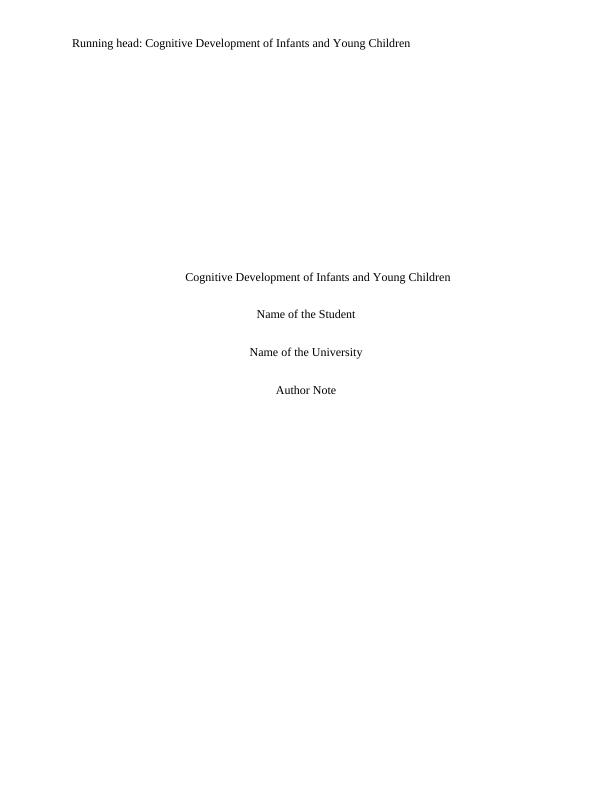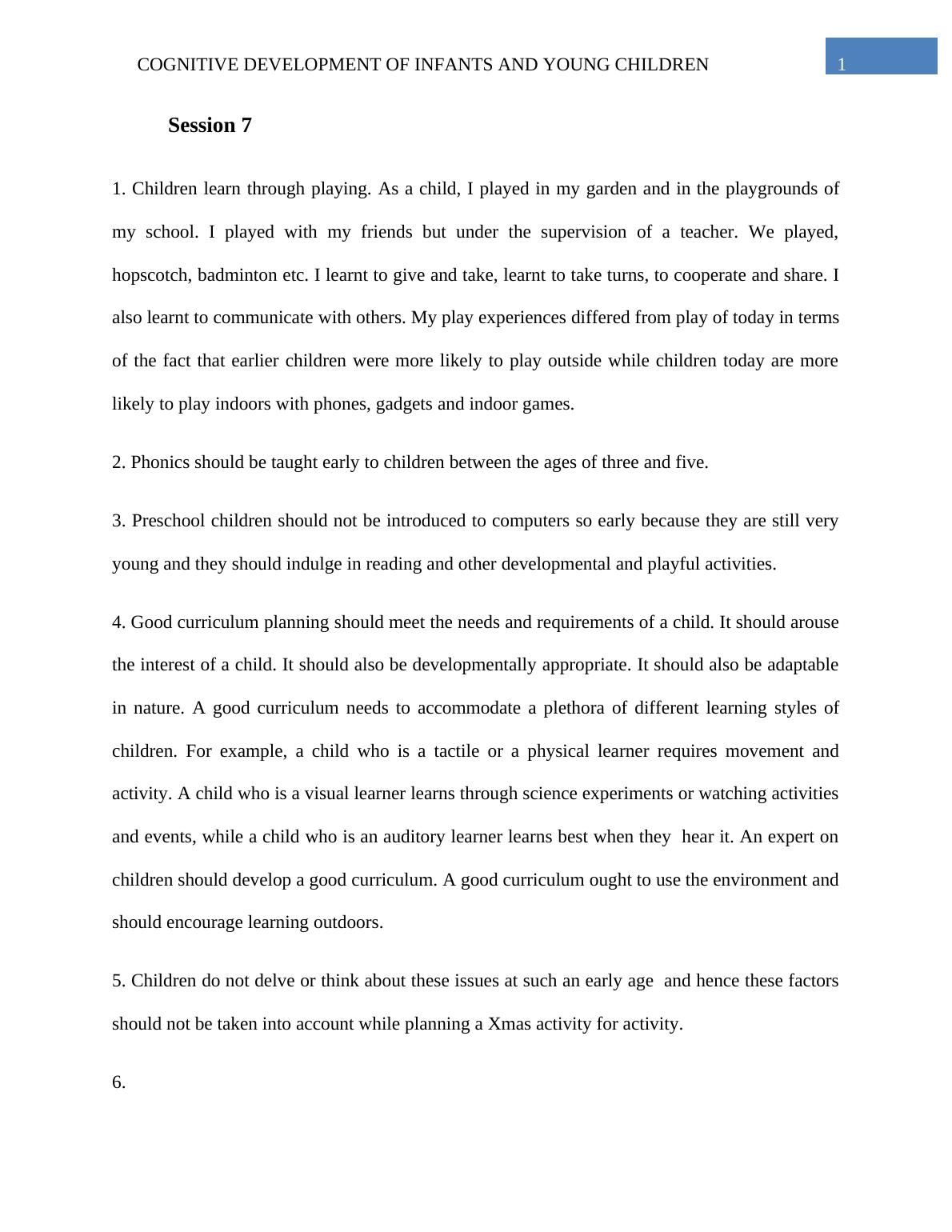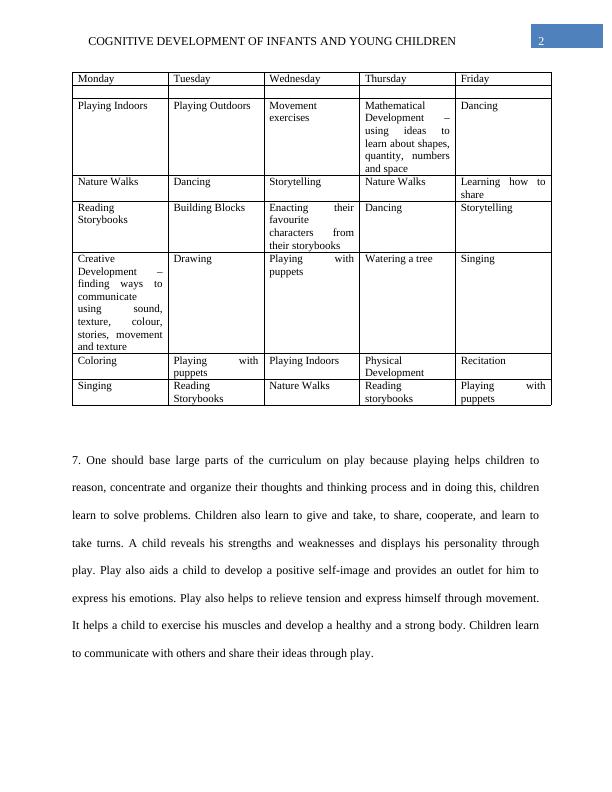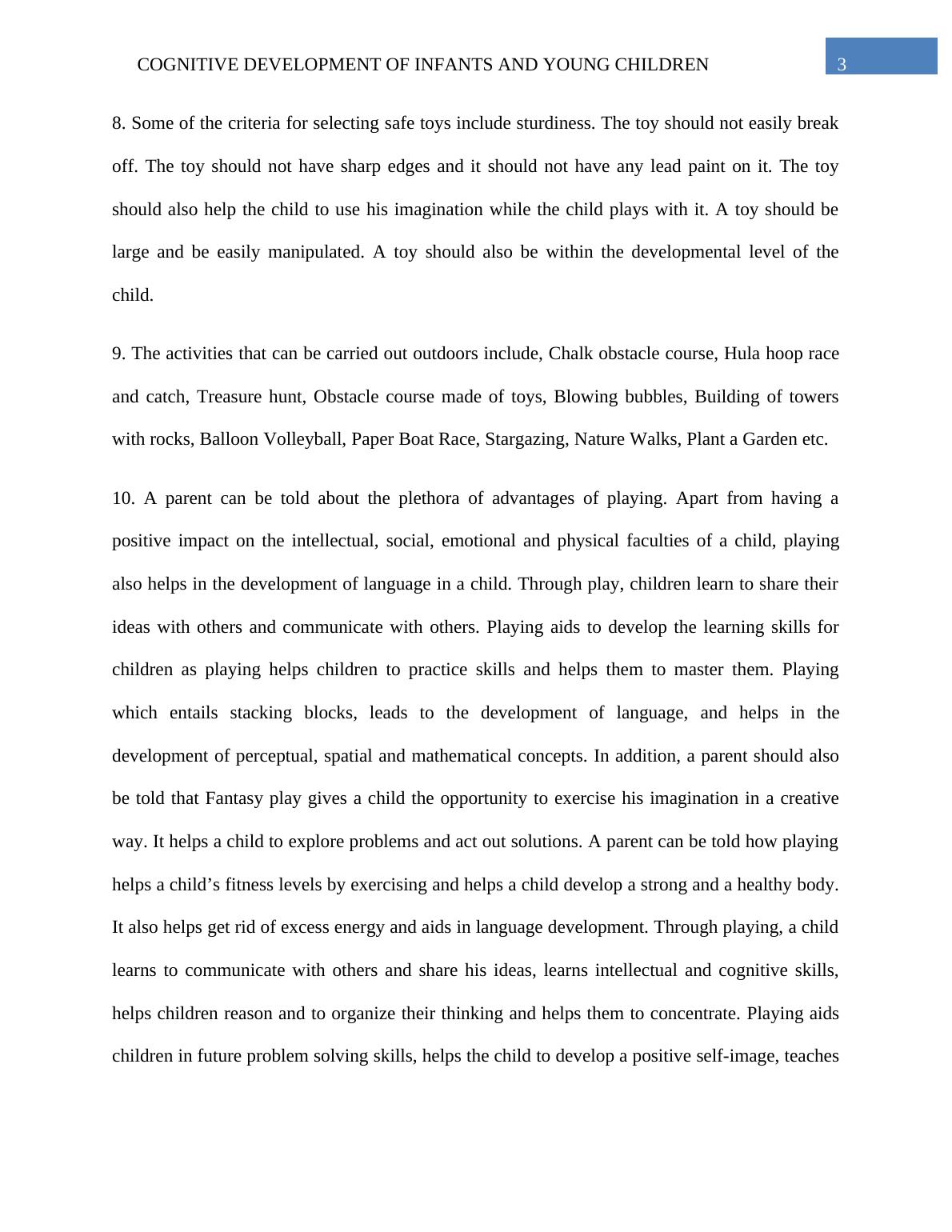Cognitive Development of Infants and Young Children
Added on 2023-04-21
12 Pages3238 Words193 Views
Running head: Cognitive Development of Infants and Young Children
Cognitive Development of Infants and Young Children
Name of the Student
Name of the University
Author Note
Cognitive Development of Infants and Young Children
Name of the Student
Name of the University
Author Note

1COGNITIVE DEVELOPMENT OF INFANTS AND YOUNG CHILDREN
Session 7
1. Children learn through playing. As a child, I played in my garden and in the playgrounds of
my school. I played with my friends but under the supervision of a teacher. We played,
hopscotch, badminton etc. I learnt to give and take, learnt to take turns, to cooperate and share. I
also learnt to communicate with others. My play experiences differed from play of today in terms
of the fact that earlier children were more likely to play outside while children today are more
likely to play indoors with phones, gadgets and indoor games.
2. Phonics should be taught early to children between the ages of three and five.
3. Preschool children should not be introduced to computers so early because they are still very
young and they should indulge in reading and other developmental and playful activities.
4. Good curriculum planning should meet the needs and requirements of a child. It should arouse
the interest of a child. It should also be developmentally appropriate. It should also be adaptable
in nature. A good curriculum needs to accommodate a plethora of different learning styles of
children. For example, a child who is a tactile or a physical learner requires movement and
activity. A child who is a visual learner learns through science experiments or watching activities
and events, while a child who is an auditory learner learns best when they hear it. An expert on
children should develop a good curriculum. A good curriculum ought to use the environment and
should encourage learning outdoors.
5. Children do not delve or think about these issues at such an early age and hence these factors
should not be taken into account while planning a Xmas activity for activity.
6.
Session 7
1. Children learn through playing. As a child, I played in my garden and in the playgrounds of
my school. I played with my friends but under the supervision of a teacher. We played,
hopscotch, badminton etc. I learnt to give and take, learnt to take turns, to cooperate and share. I
also learnt to communicate with others. My play experiences differed from play of today in terms
of the fact that earlier children were more likely to play outside while children today are more
likely to play indoors with phones, gadgets and indoor games.
2. Phonics should be taught early to children between the ages of three and five.
3. Preschool children should not be introduced to computers so early because they are still very
young and they should indulge in reading and other developmental and playful activities.
4. Good curriculum planning should meet the needs and requirements of a child. It should arouse
the interest of a child. It should also be developmentally appropriate. It should also be adaptable
in nature. A good curriculum needs to accommodate a plethora of different learning styles of
children. For example, a child who is a tactile or a physical learner requires movement and
activity. A child who is a visual learner learns through science experiments or watching activities
and events, while a child who is an auditory learner learns best when they hear it. An expert on
children should develop a good curriculum. A good curriculum ought to use the environment and
should encourage learning outdoors.
5. Children do not delve or think about these issues at such an early age and hence these factors
should not be taken into account while planning a Xmas activity for activity.
6.

2COGNITIVE DEVELOPMENT OF INFANTS AND YOUNG CHILDREN
Monday Tuesday Wednesday Thursday Friday
Playing Indoors Playing Outdoors Movement
exercises
Mathematical
Development –
using ideas to
learn about shapes,
quantity, numbers
and space
Dancing
Nature Walks Dancing Storytelling Nature Walks Learning how to
share
Reading
Storybooks
Building Blocks Enacting their
favourite
characters from
their storybooks
Dancing Storytelling
Creative
Development –
finding ways to
communicate
using sound,
texture, colour,
stories, movement
and texture
Drawing Playing with
puppets
Watering a tree Singing
Coloring Playing with
puppets
Playing Indoors Physical
Development
Recitation
Singing Reading
Storybooks
Nature Walks Reading
storybooks
Playing with
puppets
7. One should base large parts of the curriculum on play because playing helps children to
reason, concentrate and organize their thoughts and thinking process and in doing this, children
learn to solve problems. Children also learn to give and take, to share, cooperate, and learn to
take turns. A child reveals his strengths and weaknesses and displays his personality through
play. Play also aids a child to develop a positive self-image and provides an outlet for him to
express his emotions. Play also helps to relieve tension and express himself through movement.
It helps a child to exercise his muscles and develop a healthy and a strong body. Children learn
to communicate with others and share their ideas through play.
Monday Tuesday Wednesday Thursday Friday
Playing Indoors Playing Outdoors Movement
exercises
Mathematical
Development –
using ideas to
learn about shapes,
quantity, numbers
and space
Dancing
Nature Walks Dancing Storytelling Nature Walks Learning how to
share
Reading
Storybooks
Building Blocks Enacting their
favourite
characters from
their storybooks
Dancing Storytelling
Creative
Development –
finding ways to
communicate
using sound,
texture, colour,
stories, movement
and texture
Drawing Playing with
puppets
Watering a tree Singing
Coloring Playing with
puppets
Playing Indoors Physical
Development
Recitation
Singing Reading
Storybooks
Nature Walks Reading
storybooks
Playing with
puppets
7. One should base large parts of the curriculum on play because playing helps children to
reason, concentrate and organize their thoughts and thinking process and in doing this, children
learn to solve problems. Children also learn to give and take, to share, cooperate, and learn to
take turns. A child reveals his strengths and weaknesses and displays his personality through
play. Play also aids a child to develop a positive self-image and provides an outlet for him to
express his emotions. Play also helps to relieve tension and express himself through movement.
It helps a child to exercise his muscles and develop a healthy and a strong body. Children learn
to communicate with others and share their ideas through play.

3COGNITIVE DEVELOPMENT OF INFANTS AND YOUNG CHILDREN
8. Some of the criteria for selecting safe toys include sturdiness. The toy should not easily break
off. The toy should not have sharp edges and it should not have any lead paint on it. The toy
should also help the child to use his imagination while the child plays with it. A toy should be
large and be easily manipulated. A toy should also be within the developmental level of the
child.
9. The activities that can be carried out outdoors include, Chalk obstacle course, Hula hoop race
and catch, Treasure hunt, Obstacle course made of toys, Blowing bubbles, Building of towers
with rocks, Balloon Volleyball, Paper Boat Race, Stargazing, Nature Walks, Plant a Garden etc.
10. A parent can be told about the plethora of advantages of playing. Apart from having a
positive impact on the intellectual, social, emotional and physical faculties of a child, playing
also helps in the development of language in a child. Through play, children learn to share their
ideas with others and communicate with others. Playing aids to develop the learning skills for
children as playing helps children to practice skills and helps them to master them. Playing
which entails stacking blocks, leads to the development of language, and helps in the
development of perceptual, spatial and mathematical concepts. In addition, a parent should also
be told that Fantasy play gives a child the opportunity to exercise his imagination in a creative
way. It helps a child to explore problems and act out solutions. A parent can be told how playing
helps a child’s fitness levels by exercising and helps a child develop a strong and a healthy body.
It also helps get rid of excess energy and aids in language development. Through playing, a child
learns to communicate with others and share his ideas, learns intellectual and cognitive skills,
helps children reason and to organize their thinking and helps them to concentrate. Playing aids
children in future problem solving skills, helps the child to develop a positive self-image, teaches
8. Some of the criteria for selecting safe toys include sturdiness. The toy should not easily break
off. The toy should not have sharp edges and it should not have any lead paint on it. The toy
should also help the child to use his imagination while the child plays with it. A toy should be
large and be easily manipulated. A toy should also be within the developmental level of the
child.
9. The activities that can be carried out outdoors include, Chalk obstacle course, Hula hoop race
and catch, Treasure hunt, Obstacle course made of toys, Blowing bubbles, Building of towers
with rocks, Balloon Volleyball, Paper Boat Race, Stargazing, Nature Walks, Plant a Garden etc.
10. A parent can be told about the plethora of advantages of playing. Apart from having a
positive impact on the intellectual, social, emotional and physical faculties of a child, playing
also helps in the development of language in a child. Through play, children learn to share their
ideas with others and communicate with others. Playing aids to develop the learning skills for
children as playing helps children to practice skills and helps them to master them. Playing
which entails stacking blocks, leads to the development of language, and helps in the
development of perceptual, spatial and mathematical concepts. In addition, a parent should also
be told that Fantasy play gives a child the opportunity to exercise his imagination in a creative
way. It helps a child to explore problems and act out solutions. A parent can be told how playing
helps a child’s fitness levels by exercising and helps a child develop a strong and a healthy body.
It also helps get rid of excess energy and aids in language development. Through playing, a child
learns to communicate with others and share his ideas, learns intellectual and cognitive skills,
helps children reason and to organize their thinking and helps them to concentrate. Playing aids
children in future problem solving skills, helps the child to develop a positive self-image, teaches

End of preview
Want to access all the pages? Upload your documents or become a member.
Related Documents
Infants and Toddlers Reportlg...
|8
|1613
|17
Cognitive Development of Infants and Young Childrenlg...
|7
|1368
|371
Early Childhood Education and Carelg...
|4
|846
|67
Importance of Music, Movement and Drama in Early Childhood Educationlg...
|10
|2607
|313
Assignment 1B: Preliminary Activity Planlg...
|11
|1946
|186
Child Study Choosing Development Domainlg...
|22
|5946
|415
